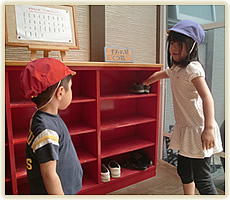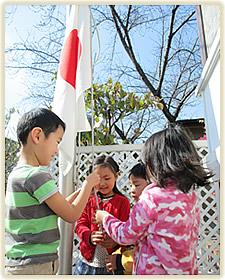| |
| |
 |
| |
先生や友だちとの関わりの中で自分の気持ちを伝え、また相手の話を聞くことができるようになっていきます。 |
| |
|
| |
 |
| |
身の回りのことは自分でします。また、異年齢との関わりで「~してもらう」「~してあげる」ことで出来ることが増えていきます。 |
| |
|
| |
 |
| |
園庭で身体を使って思い切り遊んでいます。
砂山や、泥だんご作りがお気に入りです。 |
| |
|
|
|
| |
 |
Have a variety of chances to express personality → Each child has time and place to develop their own personality. |
|
| |
|
・Children can feel the seasonal change both in the garden and rooms. |
|
| |
|
・Our curriculum has painting, exercise, drama, and music. Children can choose what and when they want to do following the curriculum. |
|
| |
|
|
 |
| |
 |
Form the basis to become an international person → Children need experiences to be aware of their identity as Japanese. |
|
| |
|
・We serve Japanese dish for lunch. |
|
| |
|
・Learn Japanese table manners, such as how to use chopsticks and dishes. |
|
| |
|
・Learn about Japanese traditional events, old Japanese stories and songs. Also, looking at the national flag which is kept in our garden, children may realize identity as Japanese. |
|
| |
|
・Children are expected to understand the correct Japanese language through their daily life. They learn reading and writing Japanese hiragana. |
|
| |
|
・Have chances to use computers and English which are necessary tool for society today. |
|
| |
|
 |
 |
|
国旗を毎日揚げ下げします。
日本人としての心を大事にします。 |
|
| |
|
|
|
|
